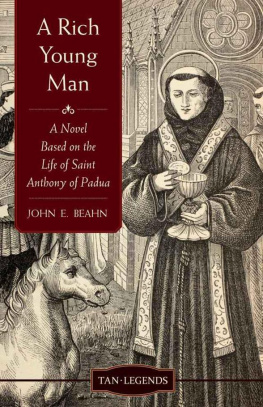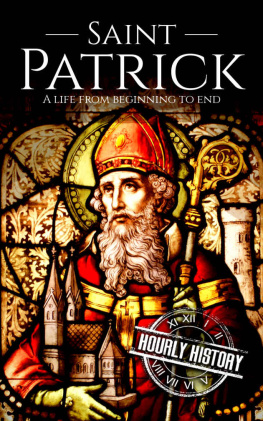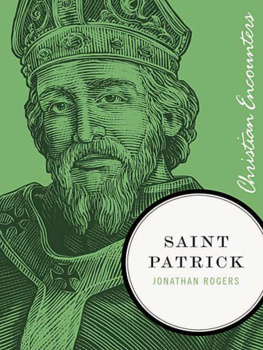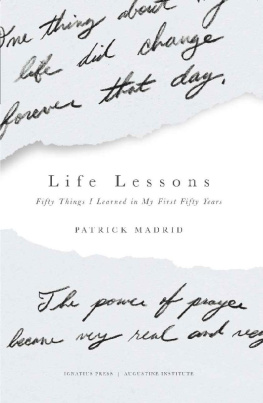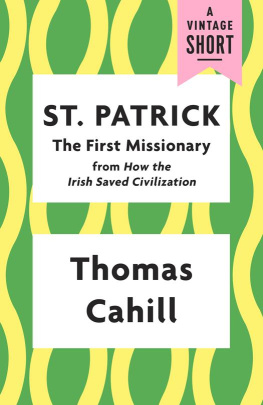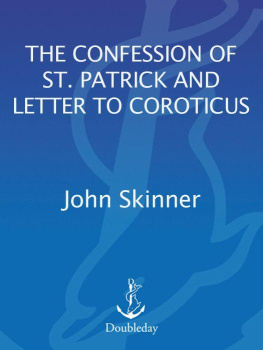Other titles by John E. Beahn in the TAN Legends Series
A MAN BORN AGAIN
A Novel Based on the Life of Saint Thomas More
A MAN OF GOOD ZEAL
A Novel Based on the Life of Saint Frances de Sales
A RICH YOUNG MAN
A Novel Based on the Life of Saint Anthony of Padua

This book was first published in 1959 by The Newman Press in Westminster, Maryland, under the title A Man Cleansed By God: A Novel Based on St. Patricks Confession. The TAN Legends edition has been re-typeset and revised to include corrections of typographical errors and updating of punctuation, spelling and diction.
TAN Legends edition copyright 2013 TAN Books.
All rights reserved. With the exception of short excerpts used in articles and critical reviews, no part of this work may be reproduced, transmitted, or stored in any form whatsoever, printed or electronic, without the prior written permission of the publisher.
Cover design by Caroline Kiser.
ISBN: 987-0-9575978-8-1
Cataloging-in-Publication data on file with the Library of Congress.
Printed and bound in the United States of America.
TAN Books
Charlotte, North Carolina
www.TANBooks.com
2013
To these spiritual sons of Saint Patrick and my friends
Rt. Rev. Msgr. John J. Daly
Rev. Edward J. A. Nestor (R.I.P.)
Rev. Daniel M. Mcgrath
Rev. William A. Dumps
Rev. Patrick J. Begley
I am the true vine, and my Father is the vine-dresser. Every branch in me that bears no fruit He will take away; and every branch that bears fruit He will cleanse, that it may bear more fruit.
John 15:12
Contents
PROLOGUE
T HE old man pulled his bench forward until he could brace himself with both elbows on the table and look fixedly, even belligerently, at the blank parchment spread before him. He put the stylus to the parchment tentatively and waited stiffly as though the instrument should write of itself. For a long time he waited, but the stylus remained motionless. He lifted it and studied disappointedly the minute black mark imprinted on the writing surface. He placed the stylus into position again, lifted it, then repeated the motion several times before he realized that he was beginning to intrigue himself by his ability to place the point of the stylus precisely on the original mark.
He leaned back on his bench and let his eyes wander as they desired, to the window and the green countryside, sparkling with the wetness of dew in the early morning light. A little distance away, the ground disappeared where it dropped down to form the valley; when it reappeared, far in the distance, it rose steadily until it vanished in the morning mist that shrouded the mountains.
God had fitted him better to cross all of that country, despite his years, than to express in writing the thoughts that crowded his mind and must find their way to the parchment. Reluctantly, he forced his attention to the page, leaned forward deliberately and placed the stylus again on the original black mark.
The stylus moved slowly, arduously. I am Patrick, a sinner, most unlearned He lifted the stylus and regarded the characters approvingly. That was what he desired to say! least of all the faithful, utterly despised by many, he added readily.
Again the stylus stopped. He lifted it and bit the end carefully yet hatefully. Why did it write so slowly for him when it could write so quickly and gracefully for Sechnall? Or why had it written for Sechnall words that had travelled swiftly across all Ireland so that all the Irish heard and memorized the praises of Patrick when they should hear and memorize only the praises of God? Very properly Sechnall had referred to GodHear, all ye lovers of Godbut he had veered quickly from the thought of God to thoughts of Gods creatures: Hear, all lovers of God, the holy merits of the man blessed in Christ, Bishop Patrick, who, because of his perfect life, is likened to the angels and deemed equal to the Apostles.
Patrick stabbed the disobedient stylus at the parchment. Write! Write! he grumbled. Answer the man! Tell what must be told of me so that men may forget me and think only of God!
Slowly, the stylus resumed its work. I am imperfect in many things and I must, by this work, tell all my brethren and kinsmen in Christ what kind of person I am, despite my little training and education in the art of words. I cannot be silent; I am compelled to tell the great benefits and great graces which the Lord deigned to bestow upon me, even while I suffer and blush at revealing my lack of education.
There has been disseminated among you a poem written by my friend, Bishop Sechnall, who permitted his affection to becloud his judgment and his stylus to overpower his perception. Would that he had never written it, for it misleads all who hear it by representing me as a man constant in the fear of God, steadfast in faith, Gods faithful servant, apostolic example and model, humble, untiring, confident in God, and much more which my guilty ears cannot endure. Would to God I were such; but neither am I nor shall I ever trust myself to be as long as I am in this body of death.
Strong is he who strives daily to turn me from the faith and from the purity of the true religion to which I have devoted the days of my life; the hostile flesh tugs me toward death, that is, toward the forbidden satisfaction of fleshly desires. And I know that I did not lead a perfect life as did others of the faithful. I acknowledge it before my Lord.
I must give thanks unceasingly to God Who so often pardoned my folly and my carelessness and so many times spared me from His wrath. He had mercy on me thousands and thousands of times. He cleansed me and made me fit so that I should become what was far from me.
1
G OD began the work of cleansing Patrick for his destined mission on a pleasant day in the spring of 401.
On that day the sixteen-year-old Patrick sat atop the wall of the fort at Bannaventa and watched with practiced eyes the recruits who marched and countermarched, wheeled and halted in the parade area below him. Occasionally he grimaced with professional disdain as one or another erred awkwardly, halting the whole company and causing them to begin the maneuver again. He had witnessed the scene often, had seen other recruits begin as awkwardly as these, had watched their progress, had seen them complete their training and depart to take their places as Roman infantrymento become a part of that great force on which the peace of the civilized world depended.
Most often he watched the drill master. The man was hard and fit, wearing helmet, armor, sword and shield without effort, despite the warmth of Britains spring. He held his place in the very center of the parade area, lifting his feet rhythmically in cadence with the recruits, his voice ringing clearly.
Patrick drew up his feet and wrapped his arms around his knees, the better to enjoy the scene. Someday he too would be a hardened veteran of campaigns spanning the earth; someday he would have, as a reward, a post in such a garrison as this at Bannaventanot as drill master but as a Decurion like his father.
He frowned as a figure appeared from the shade of the buildings on the far side of the parade area. Young Father Alexius, village priest, dispenser of the sacraments to the women who attended Mass, tutor of the officers childrenand of the officers themselves when necessarycensor of soldiers morality, had come again to complain against him because he, son of the Decurion, would not demean himself to a priest as did the sons of lesser men.


